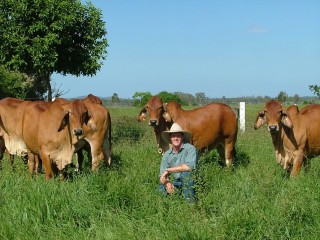 Before Monday, Bovine Johne’s disease was considered very much a ‘southern issue’ in Queensland’s cattle industry, where more than half of the nation’s beef herd is run.
Before Monday, Bovine Johne’s disease was considered very much a ‘southern issue’ in Queensland’s cattle industry, where more than half of the nation’s beef herd is run.
For the Kirk family who own the well-known and respected Rockley Brahman Stud at Bajool near Rockhampton, the disease barely registered on their radar.
“We knew nothing about it, other than New South Wales bulls weren’t allowed to sell to Western Australia when they were sold at Rockhampton Brahman Week Sale, because of BJD,” Ashley Kirk explained in a written statement sent to media on Tuesday.
Without warning, the disease became the central focus of their lives one month ago when test results identified BJD as the cause of illness in three cows on Rockley.
While previous reported outbreaks have been mainly confined to southern states, and primarily in dairy herds, the technical reality is that, while rare in beef herds, BJD could affect any beef cattle property, regardless of breed or type of operation.
It can arrive on a farm in a visibly healthy but infected animal. BJD is also known to be present in more than 100 species of domestic and wild animals in Australia, and can survive in soil for long periods, making it extremely difficult to eradicate. There is no cure or effective treatment.
The Kirks do not know when or how BJD came to Rockley, but, regardless of the source, its arrival has affected their business dramatically and irrevocably.
The family had 40 bulls ready for client inspections one month ago that they have since had to cancel.
They have about 200 bulls intended for sale next year backed by 58 years of breeding that are now destined for meatworks.
They expect to see their income cut by at least 50pc next year.
“It is sad that those genetics are going to waste when you can’t use a reliable test to say if they have it or not,” Mr Kirk said.
“Our whole operation has had to change focus after years of building up a reputable business, and a rapport with clients that has been going on since my grandfather started our stud.”
One of the key concerns for the Kirks is the fact there is so little financial support available for producers in the event of a BJD detection. The only financial assistance available is a maximum payment per business of $11,000 including GST to cover the costs of testing.
“It seems the only way of eradicating this disease is to meatworks our entire breeder herd which we see as irreplaceable and would not be economical,” Mr Kirk said.
“We are choosing not to test and have no plan in place to try to eradicate this disease due to the ineffective tests and the fact we have no idea where to start trying to trace where this disease was introduced into our herd.
“We are in the process of doing IVF work now and putting those eggs into purchased recipients in the hope of continuing our stud.
“We are hoping these recipients are free from the disease but can’t really be assured of that.”
Mr Kirk said the family was in the process of isolating two paddocks at one of their properties which is not contaminated to use for birthing their “clean cattle” as they rebuild their herd.
“We are confident this will go ahead and we can look forward to selling bulls in three years down the track.”
While theirs is the first significant case of BJD to be publicly reported in Queensland, the true prevalence of the disease is not known, with minimial abattoir testing systems in place.
The Kirks say they have been privately told that their case is the third in Queensland to date, with previous reports referring to cases at Sarina and Dalby.
“The more people we talk to the more cases we are hearing about,” Mr Kirk said.



HAVE YOUR SAY